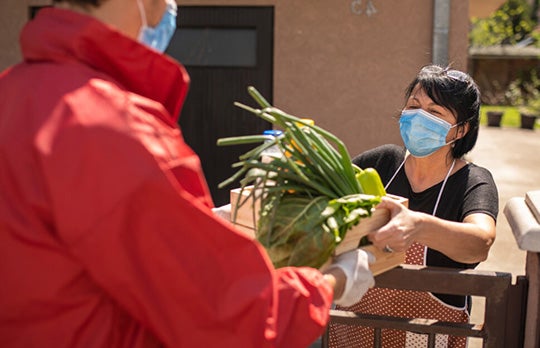
Public Exchange provides a better way to enlist university expertise for the public good
In brief:
- Launched in 2020 at USC Dornsife, Public Exchange™ offers a new, efficient way for public- and private-sector leaders to tap university expertise to tackle complex problems.
- Public Exchange has partnered with organizations including the U.N. Foundation and the city of Los Angeles on social impact projects.
- The office helps partner organizations select the right researchers from dozens of fields, handles administrative details and manages projects from start to finish.
- Inspired by her work as chief science advisor to the NYPD, USC Dornsife Dean Amber D. Miller brought the idea to fruition after years of planning and pilot projects.
What do novel cancer treatments, seat belts, ultrasounds, rocket fuel and Google have in common?
All of these innovations are the result of breakthroughs made at America’s research universities.
Today’s way of life would not exist without the contributions of creative scholars consistently pushing the boundaries of knowledge.
But you wouldn’t know that from the national conversation on higher education that, in recent decades, has focused almost exclusively on the mission of educating students and the climate for undergraduates on university campuses. The crown jewel of America’s innovation infrastructure, our university research enterprise, is increasingly forgotten or misunderstood.
Public Exchange™, a new initiative headquartered at the USC Dornsife College of Letters, Arts and Sciences, is designed to reinvigorate collaboration between the university research community and leaders in the public and private sectors.
Conceived by USC Dornsife Dean Amber D. Miller, Public Exchange™ officially launched in fall of 2020. The first-of-its-kind office streamlines access to subject experts, enabling partners beyond the university to tap a dizzying range of expertise when grappling with complex problems — in a way that is easy to navigate and affordable.
“Public Exchange™ provides the connective tissue that not only identifies appropriate expertise within the university to solve a particular problem, but it takes care of the contracts, project management and other hurdles that have traditionally made collaboration with researchers challenging,” said Miller.
Why do we need a new model?

A Public Exchange project examines COVID’s effect on food insecurity in Los Angeles. (Image Source: iStock.)
Throughout much of the 20th century, research universities were America’s go-to source for expertise. Many of the breakthroughs were rooted in partnerships between research universities and the federal government. “An unwritten social contract was established,” Miller said, “in which scholars would deliver the scientific knowledge, technologies and medical treatments that gave America its competitive edge while the public provided tax dollars to support vital research.”
In the ensuing decades, the social contract between research universities and the public began to fray. As universities and colleges around the nation saw increasing student enrollment, the national dialogue switched from one largely about research advances for the public good to one almost entirely dominated by the educational mission and campus climate issues.
Today, the most common way the private sector taps university expertise is built on Stanford University’s launch of the first Office of Technology Licensing in 1970. Responding to a growing need for more advanced computer technology and automation, Stanford developed a new way to market its faculty’s innovations in computer science and engineering to technology and biomedical companies. Stanford’s office made it easy for businesses to access the university’s intellectual property.
Research universities across the nation rapidly adopted this model, sparking the technological revolution that has yielded personal electronic devices, lifesaving drugs and surgical techniques, and autonomous machines.
“But that started more than 50 years ago,” Miller said. “The challenges we grapple with today are different.”
While tech-transfer remains important, Miller says that current challenges will not be solved by technological innovations alone. Creating a sustainable planet, for example, requires expertise from a wide range of highly specialized fields. Arguably the most substantial hurdle we are currently facing is not the dearth of new sustainable technologies, but the economic, social and political obstacles to implementing existing technologies. Applying university expertise to these areas that is directly and immediately applicable to the problems faced by civic and business partners is complicated and challenging.
Physicist’s work with the police sparks an idea
An experience that Miller had working with the New York Police Department gave her an idea for a new way of bringing academic expertise to bear on practical problems. An experimental astrophysicist at Columbia University at the time, Miller was asked in 2009 to serve for two years as the NYPD’s chief science advisor.
The police force didn’t need to understand the Big Bang, but they did need help calibrating and deploying sophisticated technological equipment designed to detect and prevent the use of radiological, chemical and biological weapons. Piloting new instrumentation was a common activity in Miller’s laboratory. By applying her experience in a different way, she provided immediate solutions to immediate challenges.
‘Imagine how much collective impact can be made when every other university adopts our model.’
The kind of serendipitous conversations between a university researcher and a counterterrorism commissioner that led to Miller’s NYPD efforts are not commonplace, but she imagined the benefit to society if experts across the nation were engaging in similar activities outside the university.
“The most relevant challenges affecting society are tremendously complex,” said Miller. “In addition to scientific innovation, research universities can provide insights from fields such as history, psychology, political science, economics and spatial science.”
Since most organizations trying to create positive social impact lack a dedicated research team to call upon, she believes that universities are an obvious, albeit often untapped, resource. They also provide a unique approach to problem-solving that differs from those taken by large consulting firms. Academic researchers, by nature of their rigorous training, are adept at defining research questions, challenging assumptions and interpreting information.
And they are at the forefront of new knowledge. Scholars are the world’s leading experts in their fields and are therefore uniquely qualified to provide insights about where technology or trends are headed well into the future.
Making expertise accessible

Public Exchange partnered with the UN Foundation on a study of climate change communication. (Image Source: iStock.)
The seed for Public Exchange had been planted when Miller worked for the NYPD. But it wasn’t until 2016, when she was appointed dean of USC Dornsife, that she was able to put her vision into action.
Miller recruited Kate Weber to serve as the inaugural executive director of an office that would be shaped into Public Exchange. As a leader at the United States Agency for International Development, Weber had spent many years fostering global partnerships and development projects. She brought distinctive experience and knowledge to oversee construction of an ambitious initiative from the ground up.
Weber and Miller spent several years talking to public- and private-sector leaders about their needs as well as the challenges that they faced when trying to work with universities. With this thorough understanding, Weber and her team set about finding ways to address these challenges. The Public Exchange™ team developed standardized agreements and processes, while piloting projects with city of Los Angeles, L.A. County, private companies and a wide range of organizations to demonstrate proof of concept.
“Our partners in the public and private sectors are facing so many complex questions,” Weber notes, “from how to design cities to reduce greenhouse gas emissions to making public transit more accessible. Our researchers have the deep expertise to dig into these problems and provide real solutions.”
Public Exchange™ has already received widespread attention in Southern California and a growing awareness on the national and even global stage.
For example, a Public Exchange project with the United Nations Foundation studied which terms used by scientists to communicate climate change were confusing to a lay audience and which might work better. Led by principal investigator Wändi Bruine de Bruin, Provost Professor of Public Policy, Psychology, and Behavioral Science, study participants said some of the terms used in recent reports issued by the Intergovernmental Panel on Climate Change (IPCC), such as “carbon neutral” and “mitigation,” were too complex to understand. Other terms, such as “adaptation,” were misunderstood in the context of climate change. Participants then suggested simpler, alternative language. The study was published in a special edition of Climatic Change, with Bruine de Bruin presenting her findings at COP26, the global conference held in Glasgow, Scotland, in November 2021 to try to limit climate change.
Miller is excited about Public Exchange’s early success and capacity to improve communities the world over. But she is also enthusiastic that her idea could spread to other research universities just like Stanford’s tech transfer model did years ago.
In addition to the tangible societal benefits, she hopes that this new model will reinvigorate the social contract between universities and the public. The increased visibility of research in action will remind those outside of academia why America’s research universities are so vital to society at large.
“Imagine how much collective impact can be made when every other university adopts our model,” said Miller. “Tens of thousands of faculty experts around the country engaged in the same way, helping to solve problems and driving progress.”